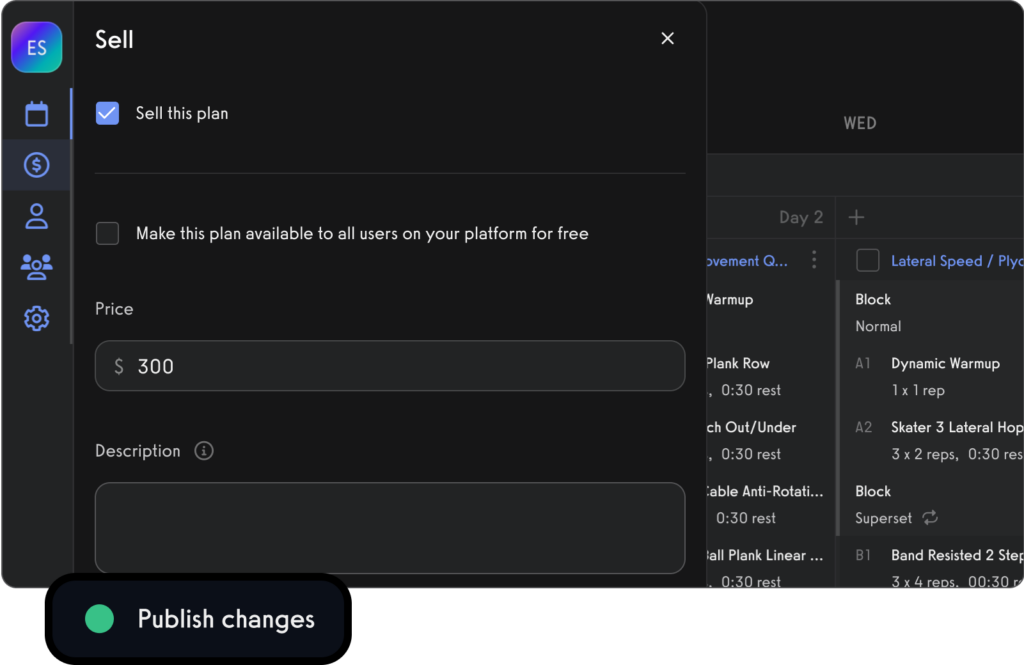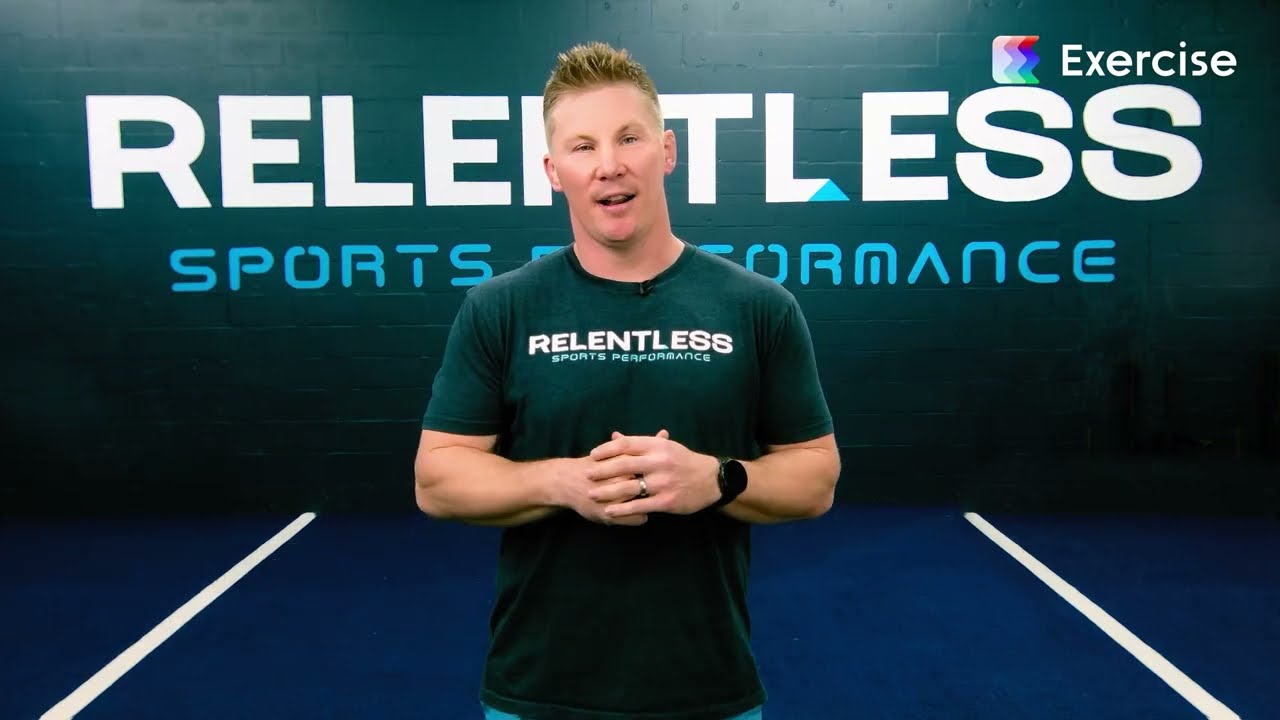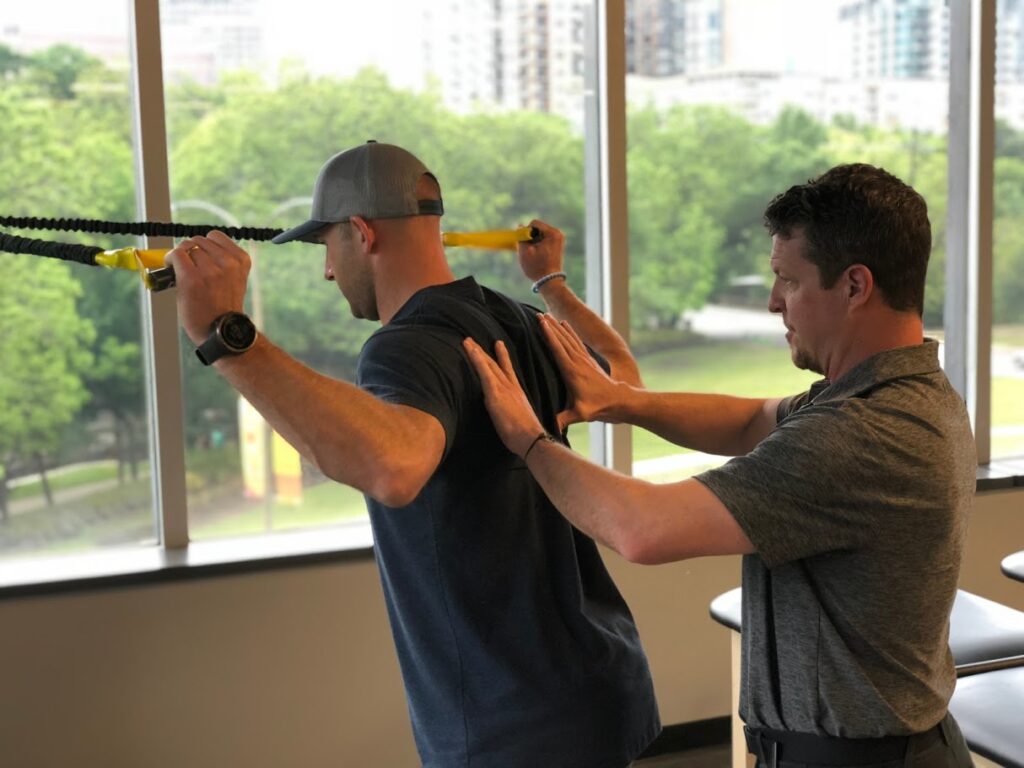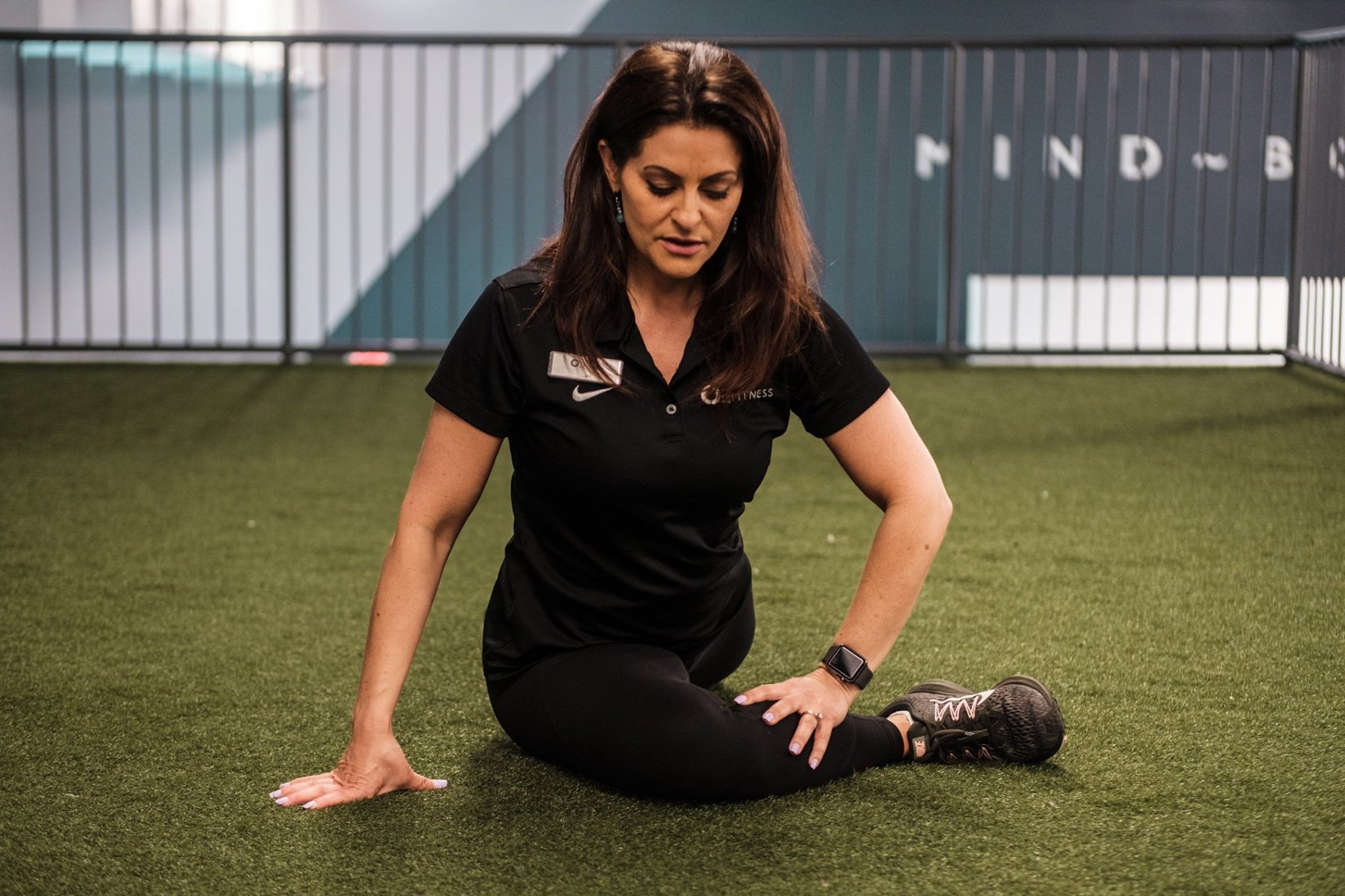How to Become a Personal Trainer in 2025
To become a personal trainer, you need to choose the right certification, complete your education, gain practical experience, and more.

Read our guide to the best personal trainer certifications to choose the certification that is right for you and your goals. This foundational step equips you with the necessary knowledge and skills to effectively train clients and help them achieve their fitness goals. Learning how to become a successful personal trainer is a journey that requires dedication, a passion for fitness, and a commitment to helping others. Learn how to get a personal training certification online and explore free online personal trainer certification bundle offers from top personal training certification providers like ISSA, NASM, and more.
Personal trainers play a crucial role in guiding individuals on their path to wellness. Whether it’s weight loss, muscle gain, improved athletic performance, or general health maintenance, personal trainers provide the expertise, motivation, and personalized plans necessary for clients to reach their objectives. With a rise in health consciousness and a growing understanding of the importance of physical activity, the demand for qualified personal trainers has never been higher. Read on to learn how to become personal trainer certified online, and how to become a fitness trainer without breaking the bank, so you can get started learning how to start a personal training business and explore the many ways to make money with fitness (you can even learn how to start an online personal training business).

Choosing the right certification is crucial, as it not only validates your knowledge and skills but also enhances your credibility in the industry. Organizations like NASM, ACE, NSCA, and ISSA offer comprehensive programs that cover various aspects of fitness training, from exercise science to nutrition and client communication. Each certification has its unique focus and specialization, allowing you to tailor your education to your career goals.
Becoming a personal trainer is just one of many ways to make money with fitness, and with the Exercise.com platform you have the best personal training software and the best online fitness coaching software in one place (not to mention the best software for fitness influencers and the best gym software!). Getting started as a personal trainer is easy. Here’s just some of what you can do on the Exercise.com platform:

Run online fitness challenges.

Create and sell fitness memberships, products, and digital offers.

Manage, message, and market to your online personal training clients and leads.

All from your very own custom branded fitness apps.


Step #1 – Choose the Right Certification
Selecting a certification that aligns with your career aspirations and training philosophy is the first step to becoming a personal trainer. Consider factors such as the organization’s reputation, the curriculum’s comprehensiveness, and any specializations that interest you.
- Research different certification programs and their requirements.
- Consider the focus of each certification to match your interests (e.g., weight loss, strength training, corrective exercise).
- Look into the accreditation of the certification to ensure it’s recognized in the industry.
Read More: Best Personal Trainer Certifications
Step #2 – Complete Your Education
Most certifications require a high school diploma as a minimum, and some may even require a degree in a related field. Completing your education ensures you have a strong foundation in the necessary subjects, such as anatomy, physiology, and nutrition.
- Enroll in relevant courses or degree programs if necessary.
- Utilize online resources and textbooks to deepen your understanding of key concepts.
- Attend workshops and seminars to gain practical insights and hands-on experience.
Step #3 – Gain Practical Experience
Practical experience is invaluable in the fitness industry. Consider internships, volunteer opportunities, or working under an experienced mentor to gain hands-on experience.
- Work at a local gym or fitness center to understand the day-to-day operations.
- Offer free or discounted sessions to friends and family to build your skills.
- Observe experienced trainers and learn from their techniques and client interactions.
Read More:
- Personal Trainer Career Options
- Personal Training Income Ideas
- Highest Paying Fitness Jobs
- How to Make Money from Fitness
Step #4 – Pass the Certification Exam
Once you’ve completed your coursework and gained some practical experience, it’s time to take and pass the certification exam. This exam tests your knowledge of exercise science, program design, and client relations.
- Prepare thoroughly by reviewing your course materials and taking practice exams.
- Develop a study schedule that allows for consistent, focused study time.
- Join study groups or online forums to discuss topics and clarify doubts.
Read More: Best Personal Training Certifications
Step #5 – Build Your Brand and Network
Developing a strong personal brand and professional network is essential for a successful career as a personal trainer. Utilize social media, attend industry events, and engage with other fitness professionals to build your presence and client base.
- Create professional social media profiles dedicated to your fitness journey and expertise.
- Attend fitness expos, workshops, and seminars to connect with industry peers.
- Collaborate with other fitness professionals to expand your knowledge and client referrals.
Read More: Fitness Industry Associations
Step #6 – Leverage Personal Training Business Software
Leveraging the best personal training business software technology can significantly enhance your training services and business operations. Exercise.com’s software is specifically designed for fitness professionals, offering tools for workout creation, client management, scheduling, and more.
- Use Exercise.com to deliver personalized workouts and track client progress.
- Offer online training and virtual classes to reach clients anywhere.
- Utilize the platform’s marketing and payment processing tools to streamline your business.
Becoming a personal trainer is a fulfilling career path that allows you to impact people’s lives positively. By following these steps and utilizing resources like Exercise.com, you can establish a successful personal training business. Whether you’re interested in working with individuals or groups, in-person or online, the right approach and tools can set you up for success.
Ready to take your personal training career to the next level? Book a demo with Exercise.com today and discover how our comprehensive platform can help you manage and grow your fitness business.

Characteristics You Need to be a Personal Trainer
- There are certain steps you should take if you have a desire to become a personal trainer.
- Getting certified and being well educated on fitness and the body is important.
- If you plan on starting your own personal training business, there are factors such as licensing, insurance, and taxes that you should be aware of.
Becoming a personal trainer takes more than just a desire to help others get into shape. To be an effective personal trainer, you need to have the appropriate training, specific skill sets and knowledge, and the ability to work with people of all different shapes, sizes, and abilities.
The truth is that anyone can become a personal trainer, but that doesn’t mean that anyone should become a personal trainer. Personal characteristics, knowledge, skills, and certification are all important. Keep reading to learn what you need to become a qualified and effective personal trainer.
Just because you are in great physical shape and love to work out doesn’t necessarily mean that you have the characteristics required of a personal trainer. A good personal trainer has to have a lot of patience for a variety of different personality types.
- Patient: As a personal trainer, especially a new one, you aren’t going to be able to be choosy about your clients. As such, you are going to work with a lot of people who are going to make a great many excuses about why they are out of shape.
- Personable: Despite what you see on TV, most personal trainers don’t get to yell their clients into shape. Yes, you can work with them to let them see that they are simply making excuses; however, you want to be motivational, not confrontational.
- Organized: In addition to being patient, you also need to be organized; this is especially true if want to become a private trainer rather than working at a club. You cannot afford to miss an appointment, lose a training plan or forget the name of a client, or fail to send out invoices.
- Physically Fit: Being in good shape can help show clients that your exercises work and can be of use when trying to demonstrate exercises correctly to your clients.
- Knowledgeable: It’s essential to have a good understanding of specific exercise types, the body in general, and ideally, of nutrition, to safely and effectively mentor another person in their fitness goals.
- Self Starter: Lastly, you have to be a self-starter; again, this is especially true if you are aspiring to be a private trainer. If you have trouble getting going each day without someone telling you what to do, then you may have difficulty managing your own business as a personal trainer.
How to Get Certified as a Personal Trainer
Once you have decided that you do have the necessary characteristics to be a personal trainer, becoming certified is important. There are many different certification programs to choose from and even in certain ways you can get a certification for free. They aren’t all the same, so you need to choose well.
The most recognized names for personal training certification are the:
- American College of Sports Medicine
- National Academy of Sports Medicine
- American Council on Exercise
The most important thing to consider is whether the certification program is the National Commission for Certifying Agencies (NCCA) certified. The NCCA is the only nationally recognized certifying agency. Your potential clients or employers will expect your certification program to be approved by this group.
Your certification should be current and you will need to take ongoing courses so that you stay up to date on new machines, new exercise methods and so on.
Read More: Best Personal Trainer Certifications
Personal Trainer Specialty Areas
You may also want to, in addition to a basic certification, become certified in specialty areas. For example, you can take courses on working with people with special needs so that you can expand your client base to include rehabilitation, working with illness and so on.
There are also personal trainers that specialize in triathlon training, bike training, Olympic training and so on. It is okay to have multiple specialized certifications, but don’t stretch yourself too thin.
First Aid
Part of your certification should include become certified in First Aid and CPR. If you are planning on working for a gym, this will be a requirement; in fact, many gyms provide free training once a year to keep their personal trainers up to date. While it may not be a requirement for becoming a private personal trainer, it will look good to potential clients that you have the ability to provide first aid support should anything happen during the workout.
Dietitians
You may want to become educated in nutrition so that you can offer dietician services too. Becoming a licensed dietitian can give you an edge and some personal trainers offer this as an additional service to their clients. Others recommend a dietitian so that a plan for both diet and exercise can be established.
Advanced Education
Lastly, if you are serious about a long-term career, you may want to consider extending your education in terms of learning about how the body, bones, and muscles work. Some personal trainers go so far as to obtain a nursing degree because it allows them to safely work and understand clients with medical limitations and diseases.
Read More: Personal Trainer Career Options
Choosing a Gym or Self-Employment
A great majority of private personal trainers started out working in a gym. The main reason for this is that they can gain experience and clients.
If you work in a gym you will work there in one of two capacities either as an independent contractor or as an employee for the gym. The benefit of being an independent contractor is that you can hand out your business cards to potential clients, and you can set your own rates and hours.
The benefit of working directly for a gym as a personal trainer is that there is a certain amount of job security. In addition, many gyms will pay for any additional training necessary to keep your certifications current and they pay for your first aid and CPR classes. You have a built-in client base and you may get health benefits. Of course, you can’t set your own rates and hours.
You can’t forget that a gym offers access to all of the high-end equipment that you, as a private personal trainer, probably don’t have.
Starting Your Own Personal Training Business
If you have never owned a business before then sometimes the best thing to do is to just start! You can even start an online personal training business! Make that first dollar! Don’t get hung up on researching or creating business plans, but if you must then consider contacting your local Small Business Administration. They usually offer classes in starting a business, ongoing courses in running that business, and even mentors to help you. As a business owner just starting out you will need to know about licensing, taxes, marketing, bookkeeping, and state laws, among other things.
Personal Training Licensing and Taxes
Legally, you must register your business where you live. You will also have to determine what your state’s requirements are for starting a business. You need to be prepared to pay for any licensing fees as well as putting money aside for your quarterly taxes.
Type of Business
You also need to decide whether you are going to be an LLC, sole proprietorship, or corporation. Most small businesses choose sole proprietorship because it is the simplest option. In addition, a sole proprietorship is the cheapest to maintain.
The downside to this option is that your personal debt and business debt go hand in hand. With other business options, such as a corporation or LLC, you are personally protected from any tax or other liability issues. With a sole proprietorship, your personal finances are at risk if something should happen to the business. Keep in mind that you can change the type of business you have whenever you choose, so you aren’t stuck with your decision for the long-term.
As with any tax or legal issue, be sure to consult with a qualified tax professional such as an attorney or CPA.
Personal Trainer Business Insurance
You will need to look into insurance for your business, otherwise, you leave yourself open to a lawsuit if someone gets injured under your care. Remember, people can get hurt during a workout plan that you designed for them, so be prepared.
If you do have a gym in your home, you need to ensure that your liability insurance covers an accident in that area of your home. If not, then you need to purchase an additional policy.
Understanding all of your options will help you make a better decision for yourself and your company.
Read More: Personal Trainer Business Insurance
Marketing Your Personal Training Business
Word of mouth is a personal trainer’s best friend; especially when you are just starting out in the business. Make sure you let everyone know about the services you are offering by promoting your personal training business effectively.
Traditional marketing materials like flyers and business cards can definitely help but some methods and strategies are simply outdated in this modern day of age. You need to take advantage of online options.
Frankly, most people will look online for services that they need before opening a phone book, newspaper, or magazine these days.
Facebook, Twitter, and other social network sites can do wonders to spread the word about your personal training business.
Having your own website can add to your accessibility and professional appearance, but there is a cost associated with both building and maintaining the site. You will also need to wade into the murky waters of SEO marketing and Google rankings. While this is doable, it can be costly and time consuming.
Read More: Personal Training Marketing Ideas
Running Your Personal Training Business
While you need to market your personal training business and attend to the bookkeeping and legal task, taking care of your clients is going to be your number one priority. On a daily basis this will involve:
- Creating client workouts
- Setting goals with clients
- Tracking goals for clients
- Sending proposals to potential clients
- Creating and sending invoices to clients
Possibly the best piece of advice to keep yourself from getting overwhelmed here is to let an expert do any tasks that you are not an expert on already.
Having the Right Personal Trainer Equipment
There is a misconception out there that if someone hires a personal trainer, that they have a private gym to work in as well. The truth is that you may need to have some equipment, depending on your set up, but you don’t have to spend a fortune.
Traveling Personal Trainers
Of major importance is buying equipment that is portable. Some personal trainers carry around dumbbells, barbells and so on to take to their clients. Of course, this is cumbersome. Starting out it’s best to work with what clients have or in a gym. Ideally, your clients will have some of the items already, and you can buy key pieces as you build your business.
Many trainers choose less traditional objects such as exercise bands, medicine balls and so on. It isn’t uncommon for a personal trainer to request their client to purchase a specific piece of equipment in order to work with them.
If you are a personal trainer that wants to focus on helping bodybuilders, then you need to have access to a gym. Some personal trainers create their own gym in their home or facility and have one client come to them at a time. The better your reputation is, the more likely it is that you will have clients willing to come to you.
You’ll want a good relationship with your local gym anyway. These are the people that are likely to recommend you.
Setting Personal Training Business Goals
If you feel you have the right personality and background to become a personal trainer then it’s time to set your goals:
- Get certified
- License and register your business
- Create a local and online marketing presence
- Use organizational tools to drive the business
- Keep yourself fit and healthy
Being a personal trainer can be a rewarding career. If you love working out and can see yourself teaching others to do the same, then this may be a great fit for you.
How to Become a Personal Trainer for Free
Yes, you can become a personal trainer free if you get a personal trainer certification online free, work at a gym that will pay for your certification, and more. Learn how to become a personal trainer for free.
- There are a few free personal training certifications online.
- If you work at a gym, your gym might sponsor your training.
- There are tuition assistance programs available for military members.
- You may be able to take advantage of community college tuition assistance programs.
- Use your savings to buy the best personal training software platform with everything you need to generate revenue.
- Free is not always best. Invest in yourself, your business, and your career.
- You can become a personal trainer for free, and many are selling workout plans online to generate revenue once they do so.
You might have goals of becoming an online personal trainer, but you may not be able to pay the fee for a personal training certification course. On the other hand, you might just want to get your toes wet before you purchase a certification course. Don’t worry though, you can become a certified personal trainer online for free if you qualify for these options. You can also just become a personal trainer for free online by following these tips.
Fortunately, there are things that you can do to obtain a personal trainer certification for free.
You may be able to receive help from your employer, take a free PT certification program, or take advantage of local education opportunities such as community college. While you consider your options, it’s important to weigh the pros and cons of going through one of these no-cost routes to earn your personal training certification. You can get a free fitness certification, but should you?
No matter the route you take, you’ll need a business management software platform to keep all of your clients in one place.
If you are ready to buy a fitness business software platform to build your fitness brand and take your earnings to the next level, did you know that you can even begin generating revenue right away by selling workout plans online? Maybe you are a social fitness influencer or simply have clients ready and willing to buy workouts from you, while it is highly recommended to invest in your own professional growth, there is nothing stopping you from beginning to sell fitness plans online right away with the Exercise.com software platform!
We will be upfront with you though—even though there are ways to become a certified personal trainer for free (more details below)—the Exercise.com software platform is not free. But if you are ready to invest into yourself and your business, you can join the thousands of fitness professionals using the Exercise.com software platform to generate revenue for their fitness business. And it’s all custom-branded, so if you want to build your brand then get a demo today.

Begin Working at a Gym
If you work at a gym, you can show them that you’re a valuable employee. You may be able to work at the front desk of a gym and take care of routine things like selling memberships, cleaning equipment, and checking in guests for their visits. Your employment is your chance to show the gym that you’re valuable to the company.
Once the gym owners think you’re a great employee, they may be interested in sponsoring your education. You might have the best chance for an employer sponsorship at a small gym where you can prove yourself to management or at a large gym that has a formal tuition sponsorship program.
If the customers love you, helping you get a personal training certification could be a great move for the gym. After you’ve proven that you’re a great employee, the gym may be willing to sponsor your education.
Use Military Benefits
Some personal trainers find their way to the fitness industry after a career in the military. The military may be a good start for a future career as a personal trainer because you learn some fitness and training techniques in military service. Military members receive education benefits. These benefits are commonly known as the GI bill. The military allows members to use these benefits for some personal training certification programs.
Most certification programs are eager to accommodate military members to help them apply their GI benefits to earn a certification. In addition to accepting GI benefits, some programs offer discounts or scholarships for military members. If you want to use your GI benefits, it’s important to make sure that your benefits apply and arrange for payment before you commit to a program.
Choose a Free Personal Trainer Certification Program
There are a few organizations online that offer free online certification programs. If all you need is any kind of certification to hang on the wall, a free online program can be a way that you can obtain one in as little as a day. Even reputable universities are offering more and more free, web-based education to the public.
It’s important to keep in mind that these programs don’t offer degrees, and the employer you want to work for may not accept them as official certification. In most cases, these programs aren’t as thorough as paid certification programs. However, they may allow you to obtain certification quickly and without having to enter credit card information.
Research Community Education Programs
Some communities offer free education for their residents. For example, Chicago residents that meet certain qualifications can pursue an associate’s degree from a Chicago community college at no charge. City Colleges of Chicago offer several fitness-related programs. Once of them is a certificate as a fitness trainer.
The State of Tennessee has a similar program. You can see if programs available in your area offer a free personal trainer certification program. Even if your community college doesn’t offer free tuition, you can apply for grants and scholarships. Community colleges and even universities offer scholarships and grants that are based on both need and academic merit.
Scholarships for college students and grant awards can eliminate or significantly reduce the cost of your higher education. You can look for information on the organization’s website, or you can make a phone call to ask for the details.
Important Things to Consider
It’s important to consider your career goals when you make a decision about how to pursue your education. Think about where you ultimately want to end up, and then decide if a free personal training certification helps you reach those goals.
Most gyms that employ and contract with personal trainers require all trainers to have a certification. Usually, you’ll need one of a handful of recognized certifications.
If you want to work at a gym, and they don’t recognize your certification, a certification that you get for free might not be helpful to you.
A free certification can teach you about the industry and help you improve your skills, but it might not be what you need to get the job that you want. On the other hand, if your employer only requires you to have any kind of certification, a free certification may meet your needs.
In addition, if you’re just looking to learn more about the industry, the free certification can be an option to learn a little bit about being a personal trainer. In any event, do your research before you choose a program, so that you’re not surprised and disappointed by where it gets you.

Which personal training certification is the best one?
Determining the “best” personal training certification depends on your specific career goals, interests, and the client demographic you wish to serve. However, several certifications are widely recognized and respected within the fitness industry:
- NASM (National Academy of Sports Medicine): Known for its Optimum Performance Training (OPT) model, NASM is highly regarded, particularly for those interested in functional fitness, corrective exercise, and performance enhancement.
- ACE (American Council on Exercise): ACE offers a comprehensive approach to fitness and wellness, emphasizing behavior change, which makes it ideal for personal trainers focused on helping clients achieve long-term lifestyle changes.
- ACSM (American College of Sports Medicine): ACSM is renowned for its scientific rigor and is often preferred by those looking to work within clinical settings or with special populations requiring tailored exercise interventions.
- ISSA (International Sports Sciences Association): ISSA provides a broad-based education that includes fitness training, nutrition, and the business aspects of running a fitness practice, making it suitable for those looking for a well-rounded certification.
- NSCA (National Strength and Conditioning Association): Particularly respected in the fields of strength and conditioning, NSCA certifications are ideal for those looking to work with athletes or in sports performance settings.
Each of these certifications has its own strengths and specializations. When choosing the best one for you, consider the focus of the certification, the reputation of the certifying organization, the continuing education opportunities it provides, and how well it aligns with your career aspirations in the fitness industry.
Read More: Best Personal Training Certifications
How much does personal training certification cost?
The cost of personal training certification packages range from $99 to $1,999. Even though there are options for getting a free personal training certification, you might consider that paying for a more expensive personal training certification from a reputable organization will have a high ROI over the course of your personal training career. The $99 personal training certification package might not be the same caliber as the more expensive route. If you want to set yourself up for success as a personal trainer, you need to invest in yourself.
How long should I study for a personal training certification exam?
It varies among individuals. If you recently finished a degree with courses covering most of the content in the exam, you might be able to take it more quickly than someone who does not have that background. With NESTA, once you register for the exam, you have 90 days to complete the exam. Other organizations will vary on their timelines.
Can you be an online personal trainer without certification?
Technically, you can be an online personal trainer without certification, but it is not recommended. Certification provides credibility, ensures you have the necessary knowledge to train clients safely, and can protect you from legal liabilities. Many clients and platforms prefer or require certified trainers. Exercise.com supports certified professionals by offering tools for managing clients, creating workout plans, and tracking progress, enhancing your credibility and effectiveness as a trainer. So, no, it is not illegal to be a personal trainer without certification in some cases, but it is highly recommended.
Do I need a degree to be a personal trainer?
No, you do not need a degree to be a personal trainer. While a degree in a related field such as exercise science can be beneficial, most personal trainer certifications do not require a college degree. Certification programs like those offered by NASM, ACE, and ISSA provide the necessary education and training to become a qualified personal trainer. Exercise.com supports both degree-holders and certified trainers by offering a comprehensive platform for managing clients, scheduling sessions, and growing your business.
Approximately what percentage of personal trainers do not have a college degree in a related field?
Approximately 60-70% of personal trainers do not have a college degree in a related field. Most personal trainers obtain certification through accredited programs rather than pursuing a formal degree. Exercise.com supports all trainers, regardless of educational background, by providing tools for client management, progress tracking, and business optimization.
What are the pros and cons of becoming a certified personal trainer?
Pros:
- Credibility and Trust: Certification provides credibility and helps build trust with clients.
- Knowledge and Skills: Certification programs offer comprehensive education in exercise science, program design, and client management.
- Career Opportunities: Many gyms and fitness centers require certification for employment.
- Legal Protection: Being certified can protect you from legal liabilities associated with training clients.
Cons:
- Cost: Certification programs can be expensive, with costs ranging from a few hundred to over a thousand dollars.
- Time Commitment: Studying for and passing the certification exam requires a significant time investment.
- Continuing Education: Maintaining certification often requires ongoing education and recertification fees.
Exercise.com supports certified personal trainers by offering tools for managing clients, scheduling sessions, and growing your business, ensuring you can maximize the benefits of your certification.
Read More: Pros and Cons of Becoming a Personal Trainer
How long does it take to become a certified personal trainer?
Becoming a certified personal trainer typically takes between three to six months, depending on the certification program and the individual’s study pace. Some accelerated programs allow for quicker completion, while others may take longer if pursued part-time. Exercise.com supports your certification journey by providing resources and tools that help you manage your studies and transition smoothly into your professional practice.
How hard is it to become a personal trainer?
The difficulty of becoming a personal trainer depends on the certification program and your background knowledge. Certification programs from reputable organizations like NASM, ACE, and ISSA require studying exercise science, anatomy, nutrition, and client management, followed by a comprehensive exam. While challenging, it is manageable with dedication and proper preparation. Exercise.com supports aspiring personal trainers by offering resources and tools to help you study effectively and apply your knowledge in a professional setting.
How much money do personal trainers make?
The income of personal trainers can vary widely based on factors such as location, experience, certifications, the setting in which they work (independent, gym employment, online coaching), and the number of clients they serve.
In the United States, the average annual income for personal trainers ranges from approximately $30,000 to $60,000. However, trainers in large metropolitan areas or those with specialized skills and a strong client base can earn significantly more, potentially exceeding $100,000 per year.
Independent personal trainers who run their own business might have the potential to earn more, especially if they offer online training services or sell fitness programs and products, but they also have to account for business expenses and self-employment taxes.
Part-time personal trainers or those just starting in the industry might earn on the lower end of the spectrum, while experienced trainers with advanced certifications and a solid client base can command higher rates.
It’s important to note that many personal trainers also work on an hourly basis, with rates that can range from $20 to $100+ per hour, depending on their qualifications and the market demand in their area.
Read More:
Where can I train my personal training clients?
There are a number of places where you could train your clients like a gym, a park, your home, their home, or your own studio.
What certification do most personal trainers have?
Most personal trainers are certified through ACE or NASM.
Can a personal trainer have a certification and be a bad trainer?
Yes; just as a doctor can have a medical degree and still be a “bad” doctor, having a personal training certification does not mean that the trainer is an effective one.
How long does becoming a certified personal trainer take?
It depends on the certification. Some only require a few days or weeks of studying; others require months of study and other pre-requisites like a college degree.
What qualification do you need to be a personal trainer?
To be a personal trainer, you typically need a certification from a recognized organization like NASM, ACE, ACSM, or ISSA. Many gyms and clients prefer trainers to have a certification that ensures a basic level of knowledge and competency in fitness training.
How do I get certified as a trainer?
To get certified as a trainer, choose a certification program from a reputable organization, meet any prerequisites they may have (like a high school diploma), complete the coursework, and pass the certification exam. Some programs may also require CPR/AED certification.
How much is a PT course?
The cost of a Personal Trainer (PT) course varies by provider and the level of certification but typically ranges from $400 to $2,000. This can include study materials, exam fees, and additional resources.
Can you do a PT course online?
Yes, many PT courses are available online, offering the flexibility to study at your own pace. Online courses from accredited organizations are recognized and respected in the fitness industry.
Is 35 too old to become a personal trainer?
No age is too old to become a personal trainer. Many people appreciate trainers who have life experience and can offer diverse perspectives on fitness and wellness.
Is it worth getting certified as a personal trainer?
Yes, getting certified as a personal trainer is worth it if you are passionate about fitness and helping others achieve their health goals. Certification can enhance your credibility, increase employment opportunities, and potentially lead to higher earnings.
Is 30 too old to be a personal trainer?
No, 30 is not too old to be a personal trainer. Personal training is a profession where diverse ages and experiences can be an asset, as clients often seek trainers who understand their specific life stage challenges and goals.
How much does it cost to get personal training certification?
The cost to get a personal training certification varies by program but generally ranges from $400 to $2,000, which usually includes study materials, exam fees, and certification costs.
Can you train people without certification?
While it’s possible to train people without certification, having a recognized certification enhances your credibility and may be required by employers. Certification ensures you have a foundational knowledge of fitness principles and safety practices.
Can you call yourself a personal trainer without certification?
Technically, you can call yourself a personal trainer without certification, but it’s not recommended. Certification is a mark of professionalism and ensures clients that you have met industry-recognized standards.
What is the hardest PT certification?
The “hardest” PT certification can be subjective, but ACSM is often cited as challenging due to its focus on clinical populations and scientific rigor. The difficulty largely depends on your background and study habits.
How much does the NASM test cost?
The NASM certification exam typically costs around $599 to $799, depending on the study package you choose. Prices may vary, and there are often promotions or discounts available.
What is a Level 3 Personal Trainer qualification?
A Level 3 Personal Trainer qualification is a certification that signifies a comprehensive understanding of fitness training principles, allowing one to work independently as a personal trainer. It covers anatomy, physiology, program design, and client interaction.
Do you need math to be a Personal Trainer?
Basic math skills are helpful for a Personal Trainer for calculating heart rates, resistance loads, and nutritional data, but advanced math is not typically necessary.
How old do you have to be to be a PT?
The minimum age to become a certified Personal Trainer is usually 18, as most certification programs require a high school diploma or equivalent as a prerequisite.
What is Level 4 PT qualification?
A Level 4 PT qualification is an advanced certification that goes beyond the foundational knowledge of a Level 3 qualification. It often focuses on specialized areas like managing lower back pain, obesity and diabetes, or strength and conditioning.
How can Exercise.com help me run a successful personal training business?
Exercise.com can help run a successful personal training business by providing a comprehensive fitness business management software platform. It offers tools for workout creation, client and class management, online training, progress tracking, and business automation, allowing you to efficiently manage your clients and grow your business.
Is it possible to get a personal trainer certification online free?
While it is rare to find entirely free personal trainer certifications, some organizations offer free courses or discounts to unemployed fitness professionals or those in need. These free courses may provide foundational knowledge but typically lack the comprehensive training required for full certification. Exercise.com can help manage your professional development by offering resources and tools that support your learning and career growth.
Will gyms pay for a personal trainer certification?
Yes, many gyms will pay for a personal trainer certification, especially if they see potential in hiring you. Some gyms offer reimbursement programs or cover certification costs as part of their employee benefits package. Exercise.com helps gym owners and managers streamline their operations, including training and certifying new staff, making it an ideal choice for fitness business management.
Is getting a personal trainer certification hard?
Getting a personal trainer certification can be challenging, depending on the certifying organization and the depth of knowledge required. Certifications from reputable organizations like NASM, ACE, and ISSA involve studying exercise science, anatomy, nutrition, and client management, followed by a comprehensive exam. Exercise.com supports certified personal trainers by offering tools to manage clients, track progress, and grow their business efficiently.
What is the best way to become a personal trainer online quick?
The best way to become a personal trainer online quickly is to choose a reputable certification program that offers an accelerated course. Organizations like ISSA and NASM offer online courses that can be completed in as little as 10 weeks. Exercise.com enhances your learning experience by providing resources and tools to help you manage your studies and transition smoothly into your professional practice.
What is the easiest personal trainer certification?
The easiest personal trainer certification to obtain is often considered to be from the International Sports Sciences Association (ISSA). ISSA offers flexible, self-paced online courses that are accessible and user-friendly, making it a popular choice for beginners. Despite being easier, it still provides valuable education and skills for personal training. Exercise.com supports ISSA-certified trainers by offering tools for client management, scheduling, and business growth.
Read More: Easiest Personal Trainer Certification
How do I learn how to become a personal trainer and nutritionist?
To become both a personal trainer and a nutritionist, you should pursue certifications from reputable organizations in each field. For personal training, consider NASM or ACE, and for nutrition, look into ISSA or Precision Nutrition. Exercise.com supports dual-certified professionals by providing a comprehensive platform to manage both fitness and nutrition clients, track progress, and grow your business.
What are the best nutrition certifications?
The best nutrition certifications include the Precision Nutrition Level 1 Certification, ISSA Nutritionist Certification, and NASM Nutrition Certification. These programs offer comprehensive education and practical skills for effective nutrition coaching. Exercise.com supports nutrition coaches by offering tools for client management, scheduling, and business optimization, ensuring you can effectively apply your certification.
Read More:
Are there free personal trainer courses online to learn about becoming a personal trainer?
There are some free personal trainer courses available online that provide introductory knowledge about the field. These courses are typically offered by fitness organizations or educational platforms and serve as a starting point. However, for full certification, you’ll need to invest in a comprehensive program. Exercise.com supports your learning journey by offering resources and tools to help you manage your studies and apply your knowledge professionally.
Does anyone offer free personal trainer courses for unemployed fitness professionals?
Some organizations and educational platforms offer free personal trainer courses or significant discounts for unemployed fitness professionals. These initiatives aim to support individuals in financial need and help them re-enter the workforce. Exercise.com enhances your professional development by providing tools for managing clients, scheduling sessions, and growing your fitness business.
Are there free personal training courses for unemployed people online?
Yes, some organizations offer free personal training courses for unemployed individuals looking to enter the fitness industry. Programs like the ACT free personal training certification (when available) and government workforce training initiatives sometimes provide free CPT certification options to eligible candidates. Some online platforms also offer personal training courses online free, but these may not always be accredited online personal training certification programs.
Is the ACT free personal training certification still available (and worth it)?
The ACT free personal training certification was once an option for individuals seeking a free fitness trainer certification, but availability varies. While it provided a basic introduction to personal training, it lacked the industry recognition of programs like ace certified personal trainer or aflca certification. If your goal is to work at a reputable gym or become a certified fitness instructor, investing in an accredited online personal training certification is often a better long-term option.
How do you become a personal trainer online quickly if you don’t have experience?
To become a personal trainer online quickly without prior experience, you can enroll in a personal training certification online free course or a low-cost program like the $99 personal training certification online. While free options exist, most recognized certifying bodies require coursework, an exam, and sometimes hands-on practical experience. Consider how to become a certified personal trainer for free through scholarship programs or employer-sponsored certifications.
What are some of the best personal trainer certification free options?
While most industry-recognized certifications require payment, some free CPT certification options exist through specific promotions, government grants, or employer reimbursement programs. If you’re looking to become a personal trainer online free, you may find personal training courses online free, but be sure to verify their accreditation before investing time.
Are there free online PT courses for personal trainer continuing education?
Yes, there are free online PT courses available for continuing education. Many organizations offer free fitness trainer course materials or online fitness courses free with certificate as part of their continuing education programs. Websites like Coursera, Udemy, and government health departments sometimes provide free personal training courses, though they may not count toward official personal trainer online certification free requirements.
Is the ACE personal trainer certification worth it?
Yes, the ace certified personal trainer certification is one of the most recognized and respected credentials in the fitness industry. While it’s not a personal training certification free option, it is an accredited online personal training certification that can help you secure employment at top gyms and fitness studios. If cost is a concern, look for employer sponsorship programs or military discounts.
Read More: ACE CPT Certification Review
What is the most basic personal training certification?
The most basic certification to become personal trainer certified is often the $99 personal training certification, which provides fundamental knowledge but lacks accreditation. To work at most gyms, you’ll need a more comprehensive and accredited online personal training certification, such as ace certified personal trainer or aflca certification.
Can I become a fitness instructor online quickly?
Yes, you can become a fitness instructor for free or at a low cost by completing a personal trainer certificate online for free through certain programs. While some free personal trainer certification online options exist, they may not meet employment requirements at gyms. Fast-track programs, like the cheapest personal training certification, allow you to get certified in as little as a few weeks.
What are the best business courses for personal trainers?
Some of the best business courses for personal trainers focus on how to become a fitness professional and how to start a fitness coaching business. Many online fitness courses free with certificate cover topics like marketing, sales, and client management. Investing in certification for personal training online that includes business development skills can help maximize earning potential.
What types of businesses that employ personal trainers are worth applying to?
Personal trainers can work at a variety of businesses, including gyms, corporate wellness programs, private studios, online coaching platforms, and boutique fitness centers. If you’re looking to become a fitness trainer online, applying to gyms that offer in-house personal trainer online certification can be a great way to get started. Additionally, personal trainers can work independently through becoming a certified trainer online and launching their own business.
What are the cheapest personal training certifications that are actually worth it?
The cheapest personal training certification options that are still widely recognized include programs like the $99 personal training certification, but most industry-standard certifications, such as ace certified personal trainer and aflca certification, cost several hundred dollars. If you’re looking for how to get a personal trainer certification for free, consider employer sponsorships, scholarships, or financial aid options.
Read More: Cheapest Personal Trainer Certifications
How to become a certified personal trainer for free?
To learn how to become a certified personal trainer for free, look for employer-sponsored training, government grants, or industry promotions that cover certification costs. Some free CPT certification options exist, but most reputable programs require at least a small fee for exams and materials.
How to get a personal trainer certification for free?
You can explore how to get a personal trainer certification for free through workforce development programs, nonprofit fitness organizations, and scholarship opportunities. Some gyms also offer in-house personal trainer free certification for employees in exchange for a work commitment.
How to get personal trainer certification for free?
If you want to know how to get personal trainer certification for free, check with state and local workforce programs, nonprofit fitness education initiatives, or gym-sponsored certification programs. Keep in mind that personal training certification free options may not be as widely accepted as paid accredited programs.
How do I become a fitness instructor for free?
You can become a fitness instructor for free through employer-funded programs, scholarship opportunities, or personal training courses online free. However, most gyms and studios require an accredited certification such as ace certified personal trainer or another recognized program.
How to become a personal trainer online free?
To become a personal trainer online free, look for free fitness trainer certification programs, community-sponsored education initiatives, or trial programs from fitness education providers. While these may not offer full certification, they can provide foundational knowledge.
How do I get certified as a personal trainer for free?
To get certified as a personal trainer for free, research personal trainer free certification options offered by nonprofits, government programs, or fitness organizations with scholarship opportunities. Most highly recognized certifications, however, require a fee.
What is the best online personal trainer certification?
The best online personal trainer certification options include accredited programs such as ace certified personal trainer, nasm, and nsca. If cost is a concern, look into financial aid options, or consider the cheapest personal trainer certification programs.
What is the best personal trainer certification online?
The best personal trainer certification online is one that is accredited and recognized by major fitness employers. Some of the top options include ace certified personal trainer, nasm, and nsca. If you’re looking for affordability, check out the $99 personal training certification or free fitness trainer certification programs.
Can you be a personal trainer without certification?
Technically, you can work as a personal trainer without certification in some private settings, but most gyms and studios require a certification for personal training. Getting an accredited online personal training certification improves job prospects and credibility.
What is the cheapest personal trainer certification?
The cheapest personal training certification options include programs like the $99 personal training certification, but it’s important to check if these are accredited. Some free CPT certification options exist, but most gyms prefer widely recognized credentials.
Read More: Cheapest Personal Trainer Certifications
How to get certified to be a personal trainer from a reputable organization?
To get certified to be a personal trainer, choose an accredited certification such as ACE certified personal trainer, NASM, or NSCA. If cost is a concern, look for personal training certification online free programs, scholarships, or employer-sponsored options.
What are some personal trainer career ideas?
Personal trainer career ideas include working in commercial gyms, private studios, corporate wellness programs, or starting your own personal training business. You can also specialize in areas like sports performance, rehabilitation, or online coaching. Exercise.com supports diverse career paths by offering a comprehensive platform to manage clients, track progress, and optimize business operations.
Read More: Personal Trainer Career Ideas
What are some personal trainer niche ideas?
Personal trainer niche ideas include focusing on specific populations or training styles, such as senior fitness, prenatal fitness, youth sports conditioning, or high-intensity interval training (HIIT). Specializing in a niche can help you stand out in the market and attract a dedicated client base. Exercise.com supports niche trainers by providing tools for customized workout plans, client engagement, and business growth.
Read More: Personal Trainer Niche Ideas
What are some of the highest paying fitness jobs?
Some of the highest paying fitness jobs include personal training in luxury gyms, sports performance coaching, corporate wellness consulting, and owning a successful fitness studio or gym. Specialized roles like physical therapists and exercise physiologists also command higher salaries. Exercise.com supports high-paying fitness careers by offering a robust platform for managing clients, scheduling sessions, and growing your business.
Read More: Highest Paying Fitness Jobs
What is the best personal training software?
The best personal training software is Exercise.com. It offers a comprehensive suite of tools for managing clients, scheduling sessions, tracking progress, and growing your business. With features like workout creation, client engagement, and business analytics, Exercise.com supports personal trainers in delivering high-quality services and optimizing their practice operations.













